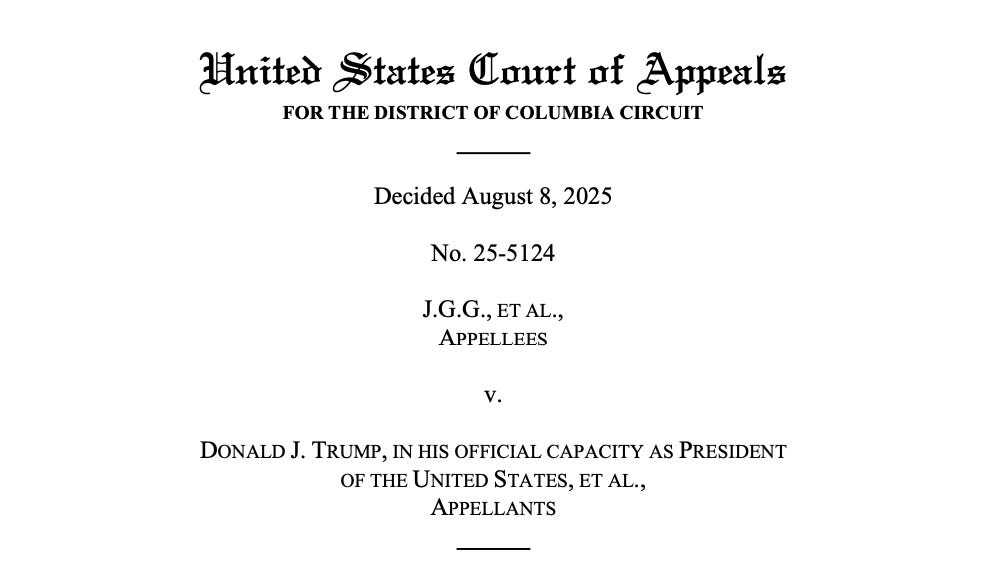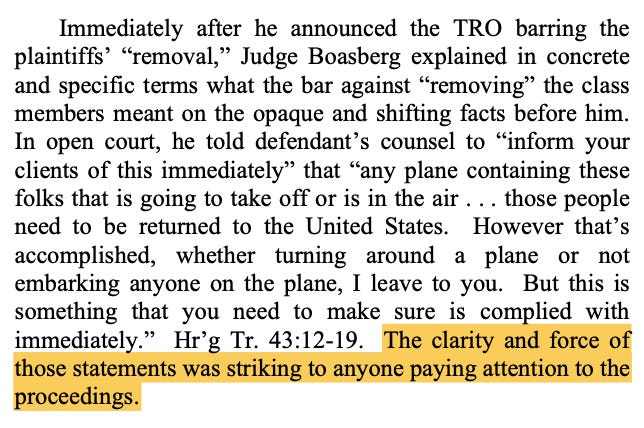D.C. Circuit Trump appointees shield Trump admin from accountability over March 15 flights
The 2-1 vote would cut off the contempt proceedings that followed the admin's Alien Enemies Act flights to CECOT. Full review by all 11 D.C. Circuit judges could follow.
On Friday, two Trump appointees on the U.S. Court of Appeals for the D.C. Circuit set aside Chief Judge James Boasberg’s district court order in his criminal contempt proceedings against the Trump administration — taking a stark action to shield the administration from accountability for its March 15 actions relating to President Donald Trump’s Alien Enemies Act proclamation.
The pair of judges decided — on differing grounds — that Boasberg had overstepped when he ordered the Trump administration in April either to explain who in the administration decided to keep the planes headed to El Savador’s CECOT prison on March 15 after Boasberg’s temporary restraining order that the administration not do so or, alternatively, to provide the process required for those people.
There was a significant delay in getting to Friday’s order — coming nearly four months, more than 100 days, after the two Trump appointees on the three-judge panel issued an “administrative stay” blocking Boasberg’s order while the appeals court considered the Justice Department’s request.
All three judges on the panel — Judges Cornelia Pillard, Gregory Katsas, and Neomi Rao — agreed that the appeals court had no jurisdiction to hear the Justice Department’s appeal of Boasberg’s order.
Despite that, Katsas and Rao, the Trump appointees, each issued a concurring opinion to explain their justifications for the “extraordinary” action of granting a writ of mandamus against the district court — an order that the lower court take certain action, here, vacating the April order in the contempt proceedings.
Pillard, an Obama appointee, issued a strong dissent, declaring that nothing less than “[t]he rule of law“ was at issue in the matter and asserting that neither the government nor the majority had shown that the Trump administration had a “clear and indisputable right” to mandamus.
Because the D.C. Circuit is made up of seven Democratic appointees and four Republican appointees — and given the stakes of the matter and the strength of Pillard’s dissent — it is likely that the full D.C. Circuit will consider hearing this matter en banc (by the full court).
According to Katsas, Boasberg’s March 15 order was “ambiguous” as to whether blocking the “removal” of such people under Trump’s Alien Enemies Act proclamation meant removal from U.S. territory or removal from U.S. custody. Accordingly, Katsas wrote:
For purposes of criminal contempt, ambiguities in the underlying injunction must be resolved in favor of the alleged contemnor. At the time of the alleged contempt, just hours after the TRO hearing and before any transcript of it was available, the district court’s minute order could reasonably have been read either way. Thus, the TRO cannot support a criminal-contempt conviction here.
This, Pillard essentially wrote in dissent, is absurd.
[T]here is no ambiguity in the TRO,” she wrote. First of all, that is not what happened. Pillard explained:
Pillard also, in describing the facts, pointed to Erez Reuveni’s whistleblower disclosures, which make even more clear how absurd Katsas’s “ambiguity” argument is.
“It is entirely inappropriate to issue a writ of mandamus under these circumstances,” she concluded.
Because of the way he resolved the questions before the appeals court, Katsas would explicitly “terminate” the entire contempt proceeding.
Rao, meanwhile, decided to go after Boasberg more directly, calling his “abuse of the contempt power is especially egregious” because of “separation of powers” concerns.
Noting that the U.S. Supreme Court had later vacated Boasberg’s March 15 order — while reinforcing the apparent constitutional violation that had occurred in carrying out people’s removal on March 15 — Rao explained her view of how that figured into why she believed Boasberg’s April order in the contempt proceedings could not stand:
Lacking the authority to compel obedience, the district court nonetheless pressured the government to take custody of alleged alien enemies held in El Salvador. This intrusion on the President’s foreign affairs authority “constitute[s] an unwarranted impairment of another branch in the performance of its constitutional duties.” … Because the order exceeds the court’s authority and amounts to a clear abuse of discretion, mandamus is appropriate.
Again, enter Pillard. She explained how no such thing had happened here.
“I am unaware of any authority, and Judge Rao cites none, providing a clear entitlement to intrude on and limit a criminal contempt inquiry because the court provides an option for the potential contemnors to take voluntary, lawful action to avoid the inquiry,“ she wrote of the option Boasberg provided to the administration to provide the people sent to CECOT under the AEA proclamation with the constitutionally required process — referred to as “purging” the contempt.
She continued: “[I]f there were merit to the defect Judge Rao sees, it would be fully and most narrowly remedied by eliminating the ‘purge’ option; her theory provides no support for her preferred remedy of vacating the entire Order.“
Although Rao technically left open future contempt proceedings, she noted that “I would not assume that such an extraordinary step is forthcoming” and warned that “the government may seek relief from this court” if Boasberg “chooses the problematic and uncertain path of criminal contempt.“
Beyond those specific responses, one of the most clear lines of argument from Pillard was that all of these questions — if they exist — could be resolved through “the ordinary appeals process.“ As such, there is no justification for the extraordinary relief of mandamus — and the heightened standards for such relief.
The majority’s failure to show that the Trump administration should get such relief is, Pillard noted, highlighted by the fact that the two Trump appointees couldn’t even agree on why Boasberg’s order “clearly” justifies such relief.
Ultimately, Pillard wrote that Friday’s decision was also about the appeals court treating the district court below it appropriately — another rule-of-law issue.
Noting Boasberg’s March 15 circumstances — “immense pressure to make a quick decision in a rapidly evolving, high-stakes situation“ — and his later “unfailing composure” in the face of “what reasonably appeared to him to be foot dragging, evasion, and outright disregard for his jurisdiction and his orders,“ Pillard concluded, “The majority does an exemplary judge a grave disservice by overstepping its bounds to upend his effort to vindicate the judicial authority that is our shared trust.”





Another day, another diminution of the rule of law.
It seems the purpose of this administration's handpicked jurists is equivalent to Bulldozer Parents and their children. Let's clear the way of any obstacle that appears now or in the future; in the family context its for the children. In the legal context, its for the president.